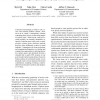Free Online Productivity Tools
i2Speak
i2Symbol
i2OCR
iTex2Img
iWeb2Print
iWeb2Shot
i2Type
iPdf2Split
iPdf2Merge
i2Bopomofo
i2Arabic
i2Style
i2Image
i2PDF
iLatex2Rtf
Sci2ools
CORR
2011
Springer
2011
Springer
Finding Deceptive Opinion Spam by Any Stretch of the Imagination
Consumers increasingly go online to rate, review and research products (Jansen, 2010; Litvin et al., 2008). Consequently, websites containing these reviews are becoming targets of opinion spam. While recent work has focused primarily on manually identifiable instances of opinion spam, in this work we study deceptive opinion spam—fictitious opinions that have been deliberately written to sound authentic. Integrating work from psychology and computational linguistics, we develop and compare three approaches to detecting deceptive opinion spam, and ultimately develop a classifier that is nearly 90% accurate on our gold-standard opinion spam dataset. Based on feature analysis of our learned models, we additionally make several important theoretical contributions, including revealing a relationship between deceptive opinions and imaginative writing.
| Added | 20 Aug 2011 |
| Updated | 20 Aug 2011 |
| Type | Journal |
| Year | 2011 |
| Where | CORR |
| Authors | Myle Ott, Yejin Choi, Claire Cardie, Jeffrey T. Hancock |
Comments (0)

